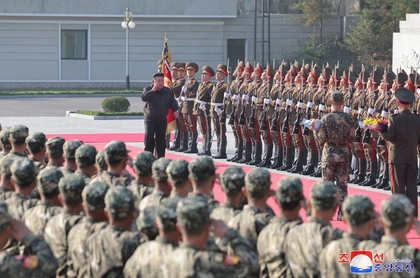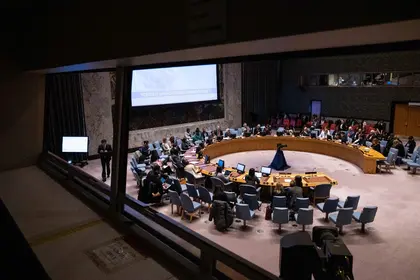The UN Security Council was divided Friday, March 31, as Western nations expressed concern about Moscow's announcement it will deploy tactical nuclear weapons in neighbouring Belarus, but permanent Council member Russia remained defiant.
China and Brazil, for their part, condemned nuclear proliferation in general as the Council met to discuss the March 25 announcement from Russian President Vladimir Putin.
JOIN US ON TELEGRAM
Follow our coverage of the war on the @Kyivpost_official.
"This is a further blow to the arms control architecture, to strategic stability in Europe, and to international peace and security," French Ambassador Nicolas de Riviere said at the meeting requested by Ukraine, which has been fighting off a Russian invasion for more than a year.
"Let us be clear: No other country has raised the prospect of nuclear use in this conflict," said Deputy British Ambassador James Kariuki, referring to the Ukraine invasion.
"No one is threatening Russia’s sovereignty," he added, condemning Putin's statement as "his latest attempt to intimidate and coerce."
"This has not worked and will not work. We will continue to support Ukraine’s efforts to defend itself," he said.
Russia, however, stuck to its position that there was no difference between what it plans to do in Belarus, and NATO's deployment of American nuclear weapons in Europe.
Western allies have called the analogy "misleading."
China and Brazil warned of the dangers of nuclear proliferation.

North Korea UN Representative Denies Pyongyang Sent Troops to Russia
"Two wrongs do not make a right," said Brazilian Ambassador Ronaldo Costa Filho.
"Reacting to a nuclear sharing arrangement or to any other perceived nuclear threat by the placement of weapons in a non-nuclear weapon state also constitutes a breach of NPT obligations," he continued, referring to the nuclear non-proliferation treaty.
"This is a race to the bottom that makes nobody safe, regardless of who made the first move."
China bluntly demanded "no deployment of nuclear weapons abroad by all nuclear weapon states and the withdrawal of nuclear weapons deployed abroad."
For its part, the UN's high representative for disarmament, Izumi Nakamitsu, called for all states to "avoid taking any actions that could lead to escalation, mistake or miscalculation."
Ukraine had sought the meeting to counter what it described as Russia's "nuclear blackmail."
Fears of a nuclear war have been rising since the invasion.
Experts believe that any Russian strike would likely involve small-size battlefield weapons, called "tactical" as opposed to "strategic" high-powered long-range nuclear weapons.
Russia will start training crews on April 3 and plans to finish the construction of a special storage facility in Belarus for tactical nuclear weapons by July 1.
Ex-Soviet state Belarus said on Friday that it was also ready to host strategic weapons.
You can also highlight the text and press Ctrl + Enter






